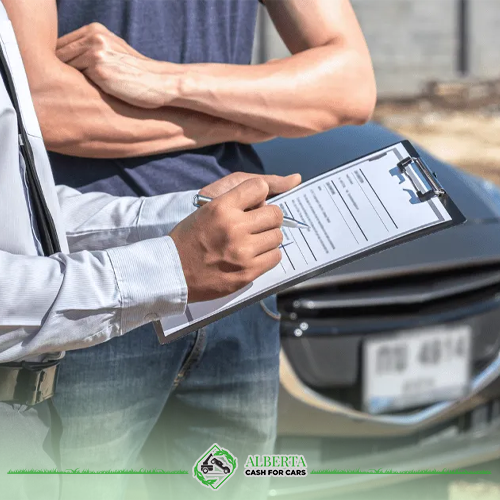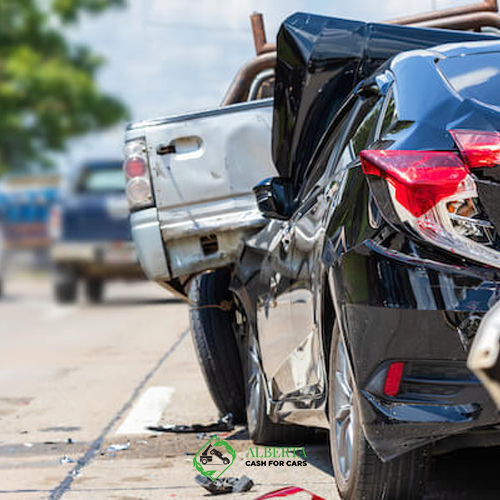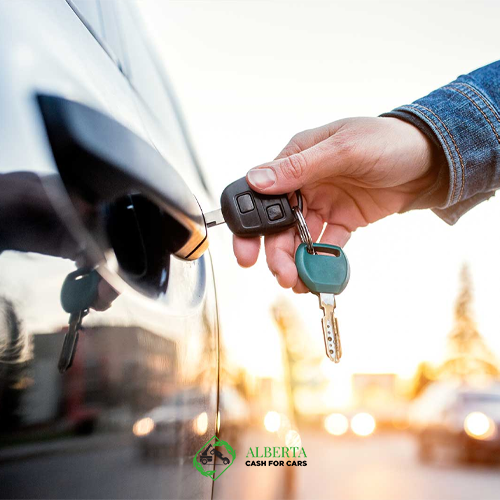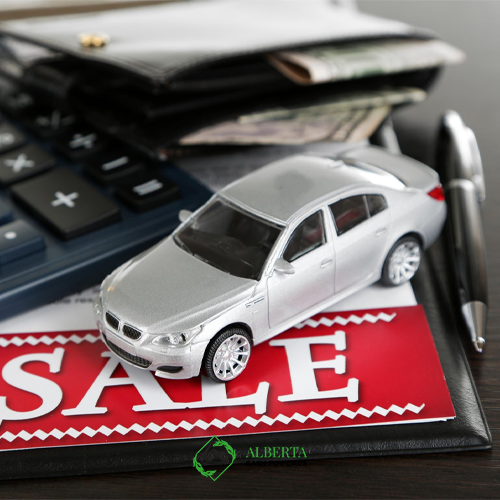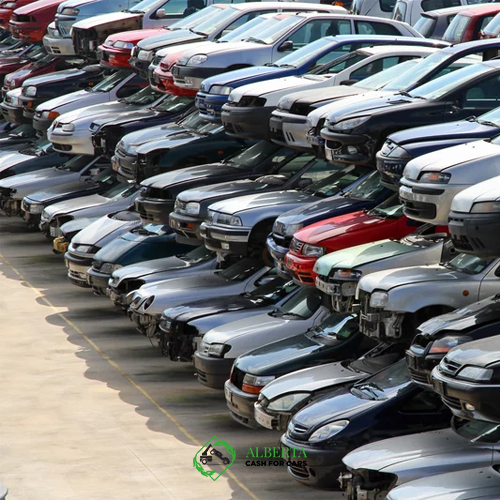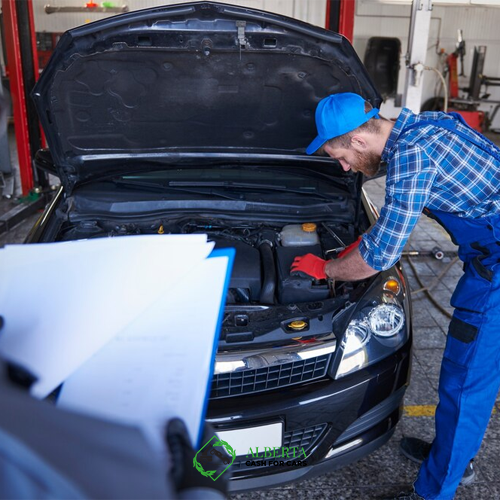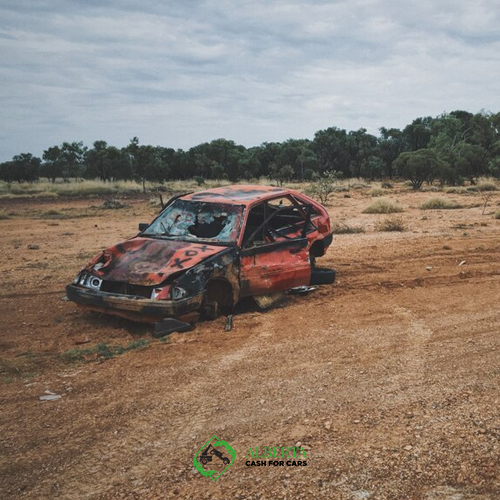The car market is not an easy market, especially if you are looking for used cars or you are interested in an old product or a collection that is hard to find; in this case, the market can be very competitive. If you are one of the lucky ones, you may find a car available that has a Restored salvage title. But what does this title mean and should you invest in it? We at Cash for Junk Cars Calgary have prepared this article for you in order to help you get complete information about this topic.
What does a Restored salvage title mean?
When a car is severely damaged, an insurance company must evaluate whether restoring it is worth the time and expense. It will be declared a loss if they do not make a decision. When this happens, the car is marked as salvage, which means an insurance company has collected the car, and this mark usually remains until the end of the car’s life.
Salvage cars are less valuable than other used cars because they are more damaged. These damages are not always visible, and without a vehicle history report, it is impossible to assess whether the car is safe to drive.
Some states allow owners of salvage vehicles to repair the vehicle and then seek another title. A restored salvage title indicates that the vehicle has met state salvage laws and can now be sold as a non-salvage vehicle. However, the car’s condition as a restored title suggests it was once a salvage vehicle. This raises important questions about the car’s history and requires careful investigation.
Should you buy the car with Restored salvage title?
Is buying a car with Restored salvage title a good idea? There is no right or wrong answer to this question. The answer depends on your specific needs, budget, and other considerations.
A restored salvage title car can be a good bet if:
- Your state’s title restoration laws ensure that the title restoration process makes the vehicle safe to drive.
- The car was restored in the state you live in, not in another state. Some dealers try to engage in title shaming, an illegal process whereby they hide a vehicle’s history by registering it in another state.
- The seller is willing to answer specific and extensive questions about the vehicle.
- This car is selling for less than market value; even cars with a restored title are worth less than cars that have not been restored because a restored title means the car has salvage status.
- You can remove any visible damage to the car without exceeding the actual selling value of the car.
- You can pay for the car in cash, and your insurer has indicated they are willing to insure it.
A Restored salvage title car is probably not the right choice for you if:
- You cannot pay in cash.
- You currently have high insurance premiums or are unsure if your insurer can insure the vehicle.
- This car has extensive and expensive external damage.
- It has a history of flooding.
- The car is from another state, or you cannot access its full history report.
- The seller does not provide you with references or has a bad reputation.
- This car is sold at a price higher than the market value, otherwise, it requires more expensive work than its real value.
- There is a used car that has not been salvaged before and has a similar price.
- You can pay a little more for a certified used car.

Pricing Considerations
When buying a vehicle in an auction with a restored title, its price is considered. The main reason for buying such a car is that it is cheaper than other cars in the market. If you won’t save significant cash by buying a refurbished title car, it’s not worth the money. The only exception to this is when the car is a collector’s item or cannot be purchased on the open market.
So how much should you pay for that car? A restored salvage title car in excellent condition should be 5% or more below market value. As the damage and problems of the car increase, the price should decrease.
Impact of Salvage Titles on Vehicle Resale Value
Salvage title Alberta title can significantly impact a vehicle’s resale value, as consumer perceptions and market dynamics play a crucial role in determining the worth of salvaged vehicles. The salvage title Alberta indicates that the vehicle has been severely damaged, written off by an insurance company, and rebuilt or repaired for road use. As a result, potential buyers often approach salvaged vehicles with caution due to concerns about safety, reliability, and the potential for hidden damages.
Consumer perceptions are a key driver in the resale value of salvage title Alberta vehicles. Many buyers view salvaged vehicles as riskier investments, as the history of extensive damage may raise doubts about the long-term durability and safety of the vehicle. Consequently, consumers are likely to demand a lower price for a salvaged vehicle than a similar model with a clean title.
Market dynamics surrounding salvaged vehicles in Alberta are influenced by the demand for affordable options and the willingness of buyers to take on the perceived risks associated with salvaged titles. Salvage title Alberta often attracts a niche market of buyers seeking lower-cost alternatives, such as budget-conscious individuals or those with mechanical expertise who are confident in their ability to assess and address any potential issues.
However, the resale value of salvage-titled vehicles is typically lower than that of comparable vehicles with clean titles. The stigma attached to salvaged vehicles often results in a reduced pool of interested buyers, and sellers may need to adjust their pricing expectations accordingly.
To navigate the challenges associated with selling salvaged vehicles in Alberta, sellers may choose to provide detailed documentation of the repairs and inspections the vehicle has undergone. Transparency about the vehicle’s history and condition can help mitigate concerns and improve its marketability.
In conclusion, the resale value of a vehicle with a salvage title in Alberta is substantially affected by consumer perceptions and market dynamics. The stigma surrounding salvaged vehicles often leads to lower resale values, with buyers approaching these vehicles cautiously due to concerns about safety and reliability. Transparent communication and documentation can play a crucial role in influencing buyer confidence and mitigating the negative impact on resale values.
How does a vehicle get a Restored salvage title?
If a car sustains extensive damage with repairs between 70 and 90 percent of the car’s value, the insurance company may treat the car as a total loss. When a decision is made, a state motor vehicle agency will retitle the car from clean to salvage or Occupancy changes. After you submit a salvage title, you cannot drive, sell, or register the vehicle until you repair it.
In this situation, the insurer usually sells the salvage vehicle to a third party interested in repairing it or disassembling it for parts. If the vehicle is repaired, it must meet safety requirements before the state motor vehicle agency can issue a rebuilt title. Giving a restored title to a repaired car gives the buyer more information about its history.
Questions to ask before buying a Restored salvage title:
- How much is the car worth?
First, you should check how much the car you want to buy is worth. If you don’t know the car’s value, you can’t know if you bought a used car at a good price. Fortunately, getting a car value is easy. You can search for the car you want on reliable websites. If the seller asks for more than the car’s value, you don’t have to reject the offer immediately; you can negotiate with the seller to get a better price. You can look for someone else if the seller’s opinion does not change.
- How old is the car?
Because of depreciation, before buying a car, you should know its life. Cars depreciate so much that most new cars lose 60% of their value in the first five years. Make sure you find the age of the car. As a result, you will know if the value of the car is still decreasing or if most of the damage has already been done. You can also use the car’s age and how it depreciates over time to your advantage to negotiate a better price.
- What is the mileage of the car?
Mileage is an important factor. Each person drives about 13,000 miles annually, and this causes a lot of wear and tear on cars. So keep this in mind when making a decision. Some vehicles can cover many miles without exceeding the speed limit. Once you know how old the car is and how many miles it has traveled, you can quickly find out if the previous owner used it a lot.
- Is the vehicle history report available?
A vehicle history report will provide essential information to help you decide if this vehicle is right for you. This information can include accidents, open recalls, service history, and previous vehicle owners. All this information can help you when it comes to achieving your goals. You can search for a car report online or get one for free from most used car dealers. You only need the vehicle identification number or license plate number.
- Does the car have mechanical problems?
Before you take the steps to buy a car, you need to make sure that the car has no mechanical problems because you definitely don’t want to find out about mechanical problems like leaking engine fluids a week after the purchase.
Transition to Rebuilt Titles
The transition from a salvage to a rebuilt title is a comprehensive process involving the restoration of a damaged vehicle to roadworthy condition. This journey is vital for individuals looking to resurrect salvaged cars, giving them a renewed opportunity on the roads of Alberta.
Alberta’s Regulatory Landscape for Rebuilt Titles
Legal Requirements
Alberta has specific legal obligations governing the rebuilding of salvage titles. Compliance with these regulations is crucial for ensuring the vehicle’s roadworthiness and legal operation.
Inspection and Certification
To obtain a rebuilt title, vehicles must undergo a thorough inspection by certified professionals. These inspections evaluate the structural, mechanical, and safety aspects of the rebuilt vehicle.
Insurance Considerations for Rebuilt Titles
Rebuilt Title Insurance
Ensuring a vehicle with a rebuilt title involves unique considerations. Owners must secure proper coverage while understanding potential limitations and factors that may affect insurance premiums.
Insurance Company Requirements
Communication with insurance providers is integral during the rebuilding process. Meeting criteria for obtaining insurance on a vehicle with a rebuilt title is essential for legal and financial protection.
Professional Assistance and DIY Considerations
Hiring Professionals
Seeking professional help in the rebuilding process offers numerous benefits. Selecting reputable mechanics, inspectors, and restoration experts ensures a thorough and reliable restoration.
DIY Rebuilding
For enthusiasts considering a do-it-yourself approach, assessing the feasibility, acquiring necessary skills, tools, and resources is crucial for a successful DIY rebuild.
Documenting the Rebuilding Process
Detailed Documentation
Meticulous record-keeping is paramount throughout the restoration process. Documenting repairs, parts replacements, and inspection outcomes provides transparency and documentation for regulatory compliance.
Vehicle Identification Number (VIN)
The Vehicle Identification Number (VIN) plays a critical role in tracking the history of salvaged vehicles. Updating and verifying the VIN during the rebuilding process is essential for accurate documentation.
Vehicle Inspection Process for salvage title Alberta
Determining the technical condition and requirements of salvage vehicles in Alberta requires a thorough inspection. Before being allowed on public roads, salvage vehicles in Alberta must meet strict performance and safety regulations.
A thorough examination of all systems and parts of the salvage vehicle is part of the vehicle inspection. This is to find out what damage was done in the collision that led to the salvage title Alberta and to make sure the right repairs are made to get the car back in working order.
- One of the important parts of the inspection process is a comprehensive check of the vehicle’s structural integrity. To ascertain whether the frame, chassis and other structural elements have been correctly fixed or replaced, this phase entails evaluating them. One of the most significant and frequent issues with salvaged cars with an Alberta salvage title is structural damage, which must be addressed to preserve the vehicle’s general safety.
- Inspectors also focus on important safety features such as airbags, seat belts, and braking systems during this process. These components are crucial in keeping passengers safe in the event of an accident, thus it is necessary to take into account how well they work. Inspectors should make sure that these safety features are in good operating order and thoroughly inspect them for any damage or defects.
- Mechanical systems such as engine, gearbox, suspension, and exhaust systems are also considered in the inspection. Each system is inspected to confirm that repairs have been performed by industry standards and that the vehicle meets the required performance criteria. This part of the process leads to the prevention of possible breakdowns, breakdowns that can be dangerous for the driver, passengers, and other people on the road.
- Among the items that are included in these inspections are lights, signals, and other electrical components. These are reviewed to confirm whether they meet regulatory standards. It is necessary to make sure that all the car lights work properly to maintain visibility and improve safe driving conditions, especially in low light conditions.
- Another thing that inspectors pay attention to is environmental considerations, among which we can mention emission systems. Compliance with emission standards is very important to minimize the environmental impact of the vehicle and comply with regulatory requirements.
During the inspection process, documentation is a significant factor. Owners of salvaged vehicles must provide specific records of repairs and modifications made to the vehicle. These records are required as proof that the work has been completed and the vehicle currently meets safety and performance standards.
After the inspection is completed, a report is generated that includes details of the findings and whether the vehicle passed the inspection successfully. If this process is passed successfully, the car is transportable and the owner can change the salvage title Alberta to restoration by providing the necessary documents, which show that the necessary repairs and inspections have been carried out.
The reasons why a vehicle might be given a salvage title
In the realm of vehicle ownership, the term “salvage title Alberta” carries significant weight, signaling a vehicle’s tumultuous past. A salvage title is typically issued when a vehicle undergoes severe damage, often due to accidents, floods, or theft recovery, rendering it economically unfeasible to repair or restore it to its original condition.
The main cause of a salvage title classification is an accident. If the cost of repairs exceeds a certain level and a car sustains significant damage in an accident, the insurance company may declare the vehicle a total loss. This cutoff point is frequently expressed as a percentage of the car’s pre-damage value. The salvage title is a warning sign in Alberta; it means that the car has either been declared too expensive to repair or has had repairs done without following the correct procedures.
In Alberta, flood damage is another important criterion that results in a salvage title. When there is significant flooding, cars that are submerged in water can sustain significant harm to their engines, electrical systems, and interiors, which is frequently irreversible. In Alberta, a car that has been declared a flood salvage is given a salvage title, which acts as a warning to prospective purchasers about the possible hazards that come with water damage.
Additionally, salvage titles can result from theft recovery. If a stolen vehicle is found, it may have incurred damages during its illicit use or could be missing crucial components. Even after recovery, the vehicle may carry a salvage title in Alberta to denote its compromised status, making it imperative for prospective buyers to exercise due diligence when considering such vehicles.
Anyone navigating the Alberta automotive market needs to comprehend the logic behind salvage title designations. A vehicle’s salvage title provides an obvious indication of the difficulties it has encountered, regardless of whether it was involved in an accident, experienced flood damage, or was the target of stolen recovery. Knowing the salvage title Alberta status gives us as customers the power to make wise choices when purchasing or selling a car, enabling us to move carefully and mindfully through the confusing world of salvage-titled automobiles.


